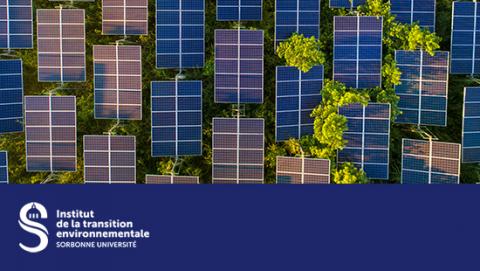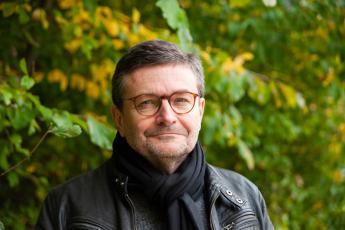
The Environmental Transition Must Be Addressed in All its Aspects
With the Institute of Environmental Transition, Sorbonne University is committed to the environment and sustainable development.

Launched in 2017 by Sorbonne University and its Alliance partners, the Sorbonne University Environmental Transition Institute (SU-ITE) addresses complex environmental and sustainable development issues in a multifaceted way. Luc Abbadie, professor of ecology at Sorbonne University, who works at the Institut d'écologie et des sciences de l'environnement de Paris (IEES) and director of SU-ITE, tells us about the objectives of this institute, which aims to be in direct contact with society.
An institute for environmental transition, a player in tomorrow's world
A platform for interaction between science and society, SU-ITE's objective is to initiate innovative education and research dynamics.
“With this institute," says Luc Abbadie, "we want to promote the knowledge resulting from Sorbonne University research and its partners in a visible and efficient way in order to transform it into operational innovations for society." This ambition is based on the ability to propose and organize original multidisciplinary projects that enable us to explore new avenues of reflection or themes that are not otherwise supported. "On issues as important as climate change, urbanization and alternative energies, we as scientists must help find transition paths to shed light on the debate," says Luc Abbadie.
As a strategic focus of Sorbonne University and the Alliance, environmental transition requires a deeper look into the multiple questions it raises. To this end, SU-ITE has started to set up an environmental think tank, made up of academic researchers, students from different disciplines, and external partners. This think tank will assist in the development of policy decisions by making scientific expertise accessible and understandable in relation to environmental transition (energy, ecology, agri-food).
Multiple skills for complex issues
Under the collegial leadership of researchers and academic researchers from different backgrounds, the institute has a unique pool of multidisciplinary expertise. Several dozen researchers, academic researchers, doctoral candidates, technicians and engineers are directly implicated by environmental transition. Associated through the institute, they can compare and enrich their data and their points of view as climatologists, ecologists, biologists, physicists, chemists, geographers, historians, anthropologists, philosophers and sociologists. Environmental transition, says Luc Abbadie, "is a set of complex problems that cannot be solved by a single approach and must be addressed in all its aspects.”
With partners such as the Métropole du Grand Paris, the Paris-Climat Agency, the Regional Biodiversity Agency, the Global Research Network on Cities and Climate Change (UCCRN) and The Nature of Cities, SU-ITE also combines the expertise of the academic world with members of civil society. This close interaction with associations, elected officials, companies and parapublic structures enables the institute to better identify real needs and to respond with appropriate proposals.
Educating as many people as possible in environmental transition
"Because environmental transition is a major challenge for society today, it must be part of everyone's basic culture," says Luc Abbadie. This is why the institute has a new transdisciplinary bachelor's degree theme: a minor in "Environment". Open to all Sorbonne University students, this minor combines courses, lectures and practical work on climate, energy, biodiversity, urbanization, agri-food transition, and so on. In order to educate students in a broader vision, these issues are addressed in a collaborative way, through scientific, legal, political, ethical and philosophical ideas.
By mixing bibliographical research, interviews and sometimes experiments, students work on concrete projects in search of sustainable and equitable ecological solutions: the organization of recycling, restoration of wetlands in a community, adaptation of green roofs, study of the impact of road networks on biodiversity, or analysis of the ecological stakes of the Paris Olympic Games. Supervised by professional partners and Sorbonne University professors, they acquire knowledge, practices and skills that can be used in the Master’s courses of their main program or in other multidisciplinary Master’s courses.
SU-ITE also organizes monthly seminars open to all, focusing on energy, agri-food, urban transition, carbon neutrality, and debates such as the one on the role of science in environmental transition. The goal here is to identify the achievements, but also the obstacles that hinder the discussion of collective ideas that will advance environmental transition.
